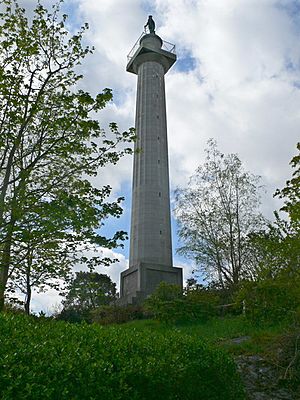Marquess of Anglesey's Column facts for kids
Quick facts for kids Marquess of Anglesey's Column |
|
|---|---|
 |
|
| Type | Monument |
| Location | Anglesey, Wales |
| OS grid reference | SH 5343 7156 |
| Built | 1817 |
|
Listed Building – Grade II
|
|
| Official name: Anglesey Column | |
| Designated | 5 February 1952 |
| Reference no. | 5432 |
| Community | Llanfair Pwllgwyngyll |
| Principal area | Isle of Anglesey |
| Lua error in Module:Location_map at line 420: attempt to index field 'wikibase' (a nil value). | |
The Marquess of Anglesey's Column is a tall stone monument in Anglesey, Wales. People also call it the Anglesey Column or Tŵr Marcwis in Welsh. It's a special type of column called a Doric column. This monument was built to honor Henry William Paget. He was the first Marquess of Anglesey. The column celebrates his bravery during the Napoleonic Wars. It's considered a very important historical building.
The monument is about 27 meters (88 feet) tall. Thomas Harrison designed it. It was put up in 1817 near Paget's home, Plas Newydd.
The foundation stone has a message carved on it. It's written in English, Welsh, and Latin. It says that the people of Anglesey and Caernarvon built the column. They wanted to thank Henry William, Marquess of Anglesey. He led the British Cavalry in Spain in 1807. He was also second-in-command at the famous Battle of Waterloo on June 18, 1815.
During the Battle of Waterloo, Paget was known as Lord Uxbridge. He was hit by a cannonball and lost his leg. It is said he turned to Lord Wellington and said, "By God, sir, I've lost my leg!" Wellington supposedly replied, "By God, sir, so you have!" Paget later received the first ever special wooden leg that could bend.
The column stands on a unique type of rock. This rock is called blueschist. It formed when pillow lavas changed under high pressure and low heat. This rock is one of the oldest known examples in the world. In 2010, the site became a Geological Site of Special Scientific Interest. This means it's a protected area because of its important geology.
Statue at the Top
The monument wasn't fully finished until 1860. This was after the Marquess had already passed away. A brass sculpture was added to the very top of the column. Matthew Noble was the artist who created this statue.
What is its Condition Now?
In recent years, the column has started to show its age. Many of the wooden steps inside the tower have rotted. This means they could be a fire risk. Because of this, the column was closed to visitors in March 2012. There are no official plans for its repair yet. The last person who looked after the column was Mr. David Blackmore. He lived in the nearby cottage and cared for the site for 20 years.
Good news came in 2018. The National Lottery gave £60,000 to help restore the column. This funding will help bring the important monument back to its best condition.
 | Frances Mary Albrier |
 | Whitney Young |
 | Muhammad Ali |

